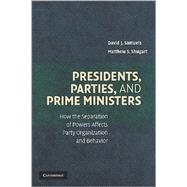
What is included with this book?
| Preface and Acknowledgments | p. ix |
| Introduction | p. 1 |
| Democracies with Elected Presidents Are Now in the Majority | p. 4 |
| The Comparative Study of Political Parties and the Missing Variable of Regime-Type | p. 7 |
| Clues from Existing Research | p. 12 |
| "Presidentialized" versus "Parliamentarized" Parties | p. 14 |
| Outline of the Book | p. 18 |
| Political Parties in the Neo-Madisonian Theoretical Framework | p. 22 |
| Democratic Regimes and the Neo-Madisonian Framework | p. 25 |
| Parties in the Neo-Madisonian Framework | p. 34 |
| Situating Parties within the Separation of Powers | p. 36 |
| President-Party Relationships under Semi-Presidentialism | p. 39 |
| Party Dilemmas under the Separation of Powers | p. 46 |
| Conclusion | p. 53 |
| Cohabitation in Semi-Presidential Systems - Cases and Data | p. 55 |
| Insiders and Outsiders: Madison's Dilemma and Leadership Selection | p. 62 |
| Defining Insiders and Outsiders | p. 65 |
| Insiders versus Outsiders: Hypotheses | p. 68 |
| Career Paths of Insiders and Outsiders | p. 72 |
| Limits of Presidentialization in Hybrid Regimes | p. 83 |
| Conclusion | p. 90 |
| Constructing the Database on Leaders' Career Paths | p. 91 |
| Constitutional Design and Intraparty Leadership Accountability | p. 94 |
| Firing Party Agents under Parliamentarism | p. 95 |
| Firing Prime Ministers under Semi-Presidentialism | p. 98 |
| Firing a Directly Elected President | p. 108 |
| Conclusion | p. 120 |
| Electoral Separation of Purpose within Political Parties | p. 123 |
| Electoral Separation of Purpose: The Physical Separation of Votes | p. 126 |
| Sources of Variation in Electoral Separation of Purpose | p. 128 |
| Measuring Electoral Separation of Purpose | p. 130 |
| Illustrative Examples of Electoral Separation of Purpose | p. 132 |
| The Global Extent of Electoral Separation of Purpose | p. 142 |
| Conclusion | p. 150 |
| Sources for District-Level Electoral Data | p. 152 |
| Countries and Elections Included | p. 159 |
| The Impact of Constitutional Change on Party Organization and Behavior | p. 162 |
| Constitutional Reforms and Expectations for Party Adaptation | p. 164 |
| Presidentialized Parties in France | p. 170 |
| Presidentialized Parties in Israel | p. 179 |
| Conclusion | p. 190 |
| Parties' "Presidential Dilemmas" in Brazil and Mexico | p. 193 |
| Presidential Dilemmas in Brazilian Parties | p. 194 |
| Presidential Dilemmas in Mexican Parties | p. 204 |
| Conclusion | p. 215 |
| Presidents, Prime Ministers, and Mandate Representation | p. 218 |
| Parties, Presidents, and Political Representation | p. 222 |
| Policy-Switching or Mandate Representation: A Global Exploration | p. 231 |
| Conclusion | p. 247 |
| Conclusion | p. 249 |
| Semi-Presidentialism Is More Presidential Than Parliamentary | p. 255 |
| Pure Types and Hybrids: Implications of Trends in Constitutional Design | p. 257 |
| The Research Agenda | p. 262 |
| References | p. 265 |
| Index | p. 289 |
| Table of Contents provided by Ingram. All Rights Reserved. |
The New copy of this book will include any supplemental materials advertised. Please check the title of the book to determine if it should include any access cards, study guides, lab manuals, CDs, etc.
The Used, Rental and eBook copies of this book are not guaranteed to include any supplemental materials. Typically, only the book itself is included. This is true even if the title states it includes any access cards, study guides, lab manuals, CDs, etc.